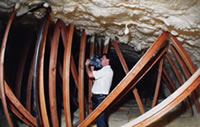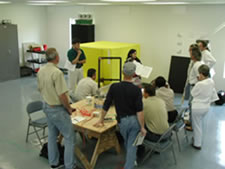
![]()
 The
Buildings Research Division’s programs cover virtually every aspect
of building science. Diverse activities, led by more than 20 scientists
and engineers, include research on heating and air conditioning
equipment, air distribution systems, insulation envelopes, efficient
windows, lights, daylighting, appliances, and control systems. Integration
of building systems produces high-quality and energy-efficient homes,
schools and commercial buildings. FSEC's building research programs include
the Building America Industrialized Housing Partnership with the U.S.
Department of Energy, Energy Star Homes with EPA, building code and energy
rating software development for the Florida Energy Office, EnergySmart
Schools program with U.S. Department of Energy and numerous monitoring
programs for Florida utility companies.
The
Buildings Research Division’s programs cover virtually every aspect
of building science. Diverse activities, led by more than 20 scientists
and engineers, include research on heating and air conditioning
equipment, air distribution systems, insulation envelopes, efficient
windows, lights, daylighting, appliances, and control systems. Integration
of building systems produces high-quality and energy-efficient homes,
schools and commercial buildings. FSEC's building research programs include
the Building America Industrialized Housing Partnership with the U.S.
Department of Energy, Energy Star Homes with EPA, building code and energy
rating software development for the Florida Energy Office, EnergySmart
Schools program with U.S. Department of Energy and numerous monitoring
programs for Florida utility companies.
The division has strong capabilities in diagnostic field testing, the development of user-friendly building energy analysis software, short- and long-term performance monitoring and equipment testing in controlled laboratory facilities.
Laboratory Research
The Buildings Research division has capabilities to perform a variety of research methods. Laboratory research is conducted to determine the energy efficiency due to one change in a building system. Detailed instruments in FSEC field laboratories have produced results accepted by national and international building standard organizations, causing changes in building codes and standards. Take a look at our building science labs: Building Science Laboratory, Manufactured Housing Laboratory, Flexible Roof Facility.
Computer Simulation Research
Computer simulation allows for modeling heat and moisture in buildings and estimating the cost-effectiveness of many energy-efficiency improvements. Division staff have developed many simulation models, including the EnergyGauge family of products used for energy code compliance for residential and commercial buildings. Learn more about our computer simulation research capabilities.
Field Research
At times, field research is required to understand how technologies perform in actual buildings with human interactions. The division has conducted large-scale residential and commercial research programs for major utilities to help them characterize energy use profiles and savings from specific programs.
Survey Research
Researchers in the division have also conducted a number of surveys with homeowners, contractors and energy managers to find potential behavior pattern links to energy use, or barriers to using energy-efficient technologies or energy conservation habits.
Buildings Diagnostic Methods
Building diagnostic methods allow for potential construction and installation problems in buildings to be resolved after the building is in operation. Our building science experts have found the causes of many mold, mildew, comfort and energy problems using infrared thermography, multi-gas monitoring, vapor analyzers, and/or pressure differential equipment.
Design Assistance
Design assistance is provided for projects so that the built product will optimize cost-effective energy efficiency and avoid the energy and comfort problems that plague many buildings. FSEC staff have provided recommendations for everything from a 120-foot tall office building sundial to hundreds of manufactured homes.
Training
 In order for most buildings to perform better, the knowledge of those who design, build and operate the building must improve. FSEC has been providing continuing education programs to contractors, designers, engineers, utility representatives and educators for years. Classes provide information from our building research that often cannot be found in a textbook. Classes range from software training to sealing air duct systems, and go beyond energy to look at comfort, durability and health and safety issues in buildings. A manufactured home and a reconfigurable small commercial building are used for hands-on training.
In order for most buildings to perform better, the knowledge of those who design, build and operate the building must improve. FSEC has been providing continuing education programs to contractors, designers, engineers, utility representatives and educators for years. Classes provide information from our building research that often cannot be found in a textbook. Classes range from software training to sealing air duct systems, and go beyond energy to look at comfort, durability and health and safety issues in buildings. A manufactured home and a reconfigurable small commercial building are used for hands-on training.
Indoor Air Quality
Indoor air quality (IAQ) is a major focus of FSEC’s building science research. It is based on our belief that buildings can be designed, built, and commissioned to minimize allergens and toxins inside, thereby reducing allergy-related illnesses and saving significant health costs. A key to improving IAQ is understanding uncontrolled air and moisture flow in buildings, and FSEC is one of the nation’s leaders in that area of research. In testing more than 600 residences and 75 commercial buildings, our researchers have determined many causes of poor indoor air quality in homes, restaurants, and offices.
Energy Ratings
The Buildings Division certifies residential and commercial building energy raters. Ratings provide a standardized evaluation of a building's energy efficiency and expected energy costs. A home energy rating can qualify a home owner or home buyer for an energy efficient mortgage or an energy improvement mortgage. In addition to generating courses and tests, software products for energy ratings are developed and distributed. FSEC maintains a database of registered buildings to evaluate predicted ratings with actual utility bills.
Green Buildings
FSEC has conducted research on green building programs throughout the country. Staff have directed efforts to develop green home, green development and green municipality standards for the Florida Green Building Coalition and have participated in developing standards for the U.S. Green Building Council. Green standards include energy efficiency, healthy buildings, disaster mitigation, water efficiency, land use, transportation, landscaping and waste reduction.
Data Monitoring
FSEC has over 20 years experience in the field of remote data monitoring and analysis. The Buildings Research Division has monitored hundreds of buildings and homes over the years, providing data for research on energy efficiency, indoor air quality and building durability. FSEC's dedicated computer staff works hard to ensure the quality and dependability of data collected at multiple sites around the country simultaneously.
Data collection, verification, archiving and management are fully automated including the processing of web-enabled reports. Data is stored in both public and secure electronic databases backed up automatically to assure integrity. Retrieval and analysis can be performed through a standard web browser. Authorized users may select any portion of the data and conduct a variety of predefined, automated analysis procedures or import the data into spread sheets or other analysis software.
Examples of data monitoring performed by FSEC's Buildings Research are located here.
